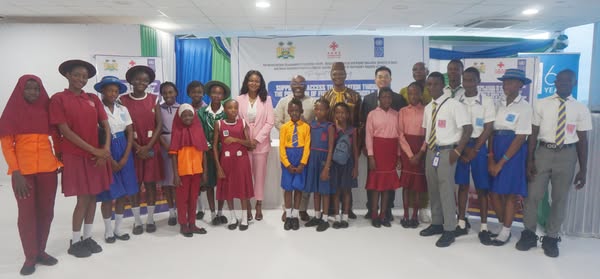By Hassan Osman Kargbo
In a major step towards improving learning conditions and expanding access to quality education, the Government of Sierra Leone, in collaboration with the Government of China and the United Nations Development Programme (UNDP), officially launched the ‘Supporting Access to Education through the Provision of Furniture to Schools and Higher Education Institutions’ project.
The initiative, which will deliver 14,700 sets of classroom furniture to schools and tertiary institutions across 13 districts, is funded by the Government of China through the Global Development Fund. It is jointly implemented by UNDP in Sierra Leone, the Government of Sierra Leone, and the Chinese Embassy in Sierra Leone.
The launch ceremony brought together senior government officials, international partners, and education stakeholders at a well-attended event aimed at showcasing the strong international collaboration driving education reform in the country.
Delivering the keynote address, Professor Alpha Wurie, Presidential Adviser on Human Capital Development, emphasized that the initiative marks a tangible investment in Sierra Leone’s educational future.
He praised the project as a practical expression of the government’s commitment to human capital development, a key pillar of the national development agenda.
“The provision of adequate furniture does more than enhance comfort. It fosters dignity, concentration, and a conducive atmosphere for learning. Today, we are not just distributing chairs and desks—we are helping build a more equitable and empowered society,” said Prof. Wurie.
Also speaking at the event, UNDP Resident Representative, Mr. Fredrick Ampiah, reaffirmed the agency’s continued support for Sierra Leone’s education sector. He noted that addressing infrastructure and resource gaps is critical to advancing Sustainable Development Goals, particularly Goal 4, which focuses on inclusive and equitable quality education.
“This is about enabling environments where both students and teachers can thrive. We are proud to be working alongside our partners to strengthen the foundations of learning across the country,” Mr. Ampiah stated.
The Minister of Basic and Senior Secondary Education, Conrad Sackey, welcomed the initiative, highlighting its role in improving school infrastructure and reducing overcrowding in classrooms. He acknowledged the chronic shortage of furniture in schools and applauded the timely intervention.
From the higher education front, Dr. Ramatulai Wurie, Minister of Technical and Higher Education, echoed similar sentiments. She pointed out that tertiary institutions, particularly Technical and Vocational Education and Training (TVET) centers, often operate under severe resource constraints. The inclusion of these institutions in the project, she said, reflects a holistic approach to educational development.
Chinese Ambassador to Sierra Leone, His Excellency Wang Qing, emphasized China’s long-standing partnership with Sierra Leone and reiterated China’s commitment to supporting the country’s education sector as part of the broader South-South cooperation.
“This is not just a donation; it is a symbol of friendship and shared vision. Education is the key to unlocking national potential, and we are proud to contribute,” Ambassador Wang noted.
The project is expected to make a significant impact by easing furniture shortages in schools and higher learning institutions, particularly in underserved districts. It reinforces Sierra Leone’s broader commitment to education as a pathway to sustainable development and national progress.










